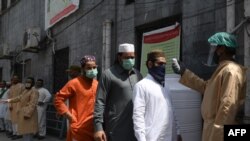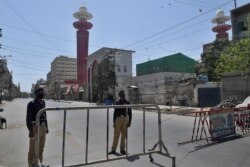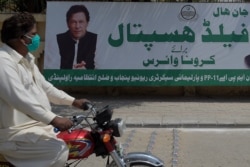Pakistani Prime Minister Imran Khan said Thursday his government would ease coronavirus-linked closures of businesses and allow some industries to open because of the risk of many of the poor starving to death.
“The ruling elite decided to … announce a lockdown instantly. They didn’t think about the poor, the daily wager, the common man and how would he cope,” Khan said in an address here.
Later that day, after chairing a meeting on COVID-19’s impact, he advocated a response similar to those of Iran and Egypt, which, he said, had “opened up all of their businesses but banned public gatherings.”
Last month, he had allowed the construction industry to open in a bid to restart the economy and provide jobs.
Meanwhile, two of the country’s four provinces have indicated they would like to go the other way and maintain a strict lockdown for the time being.
Sindh province has announced it would keep all nonessential businesses closed at least till Eid, the Muslim festival toward the end of May.
Balochistan province has indicated it may even introduce curfew-like conditions to stop the rising levels of local transmissions.
Part of the differences in policy stems from Pakistan’s governmental structure that allows provinces to chart their own course. Even within Khan’s own Tehreek-e-Insaf, or Justice Movement, party, though, the response has not been united.
Earlier this week, in a high-level meeting chaired by Khan economic adviser and de facto finance minister Hafeez Shaikh and attended by leading international development agencies, a warning was issued against the relaxation of the coronavirus-linked lockdown.
Participants thought such an action “could further increase the infection rate and put unbearable burden on the healthcare system,” according to a press release on the meeting.
The division within the government over how to deal with the pandemic’s spread has been a hallmark of Pakistan’s response from the start.
Khan argued against a lockdown from the beginning, citing high poverty rates and a flailing economy. Meanwhile provinces ruled by his own party, Punjab and Khyber Pakhtunkhwa, as well as the capital Islamabad, shut down everything except what was considered essential, such as shops selling fruits, vegetables, or meat, and banks and telecommunications companies.
Still, the orders for people to stay home or avoid gathering of more than four have not been uniformly implemented across the country, leading to scenes of people lined up outside banks to collect salaries, or crowds not following social distancing guidelines in wholesale vegetable markets.
“Lockdown or No Lockdown? Coronavirus is new so there is a major difference of opinion in the world & in Pakistan on how to handle it,” tweeted President Arif Alvi Sunday, another indication that the government was divided.
The ambiguity in government policy as to how strictly a lockdown should be enforced has led to various segments of society violating it or demanding outright relief.
People in the service industry, such as barbers, are reportedly taking appointments by phone and serving customers behind shuttered doors.
Before the start of the Muslim holy month Ramadan, the government caved into religious clerics’ pressure to keep mosques open for daily and special Ramadan nightly prayers called Taraweeh, albeit subject to a set of guidelines.
Despite a warning from Khan himself that a violation could lead to a closure of the places, those guidelines were not being followed in 80% of the mosques, according to an NGO called Pattan Development Organization that surveyed 194 mosques in 15 cities during the first few days of Ramadan.
Usman Dar, Khan’s special adviser on youth affairs, said Thursday that volunteers from a newly formed “Tiger Force” would help local authorities implement the guidelines in mosques.






